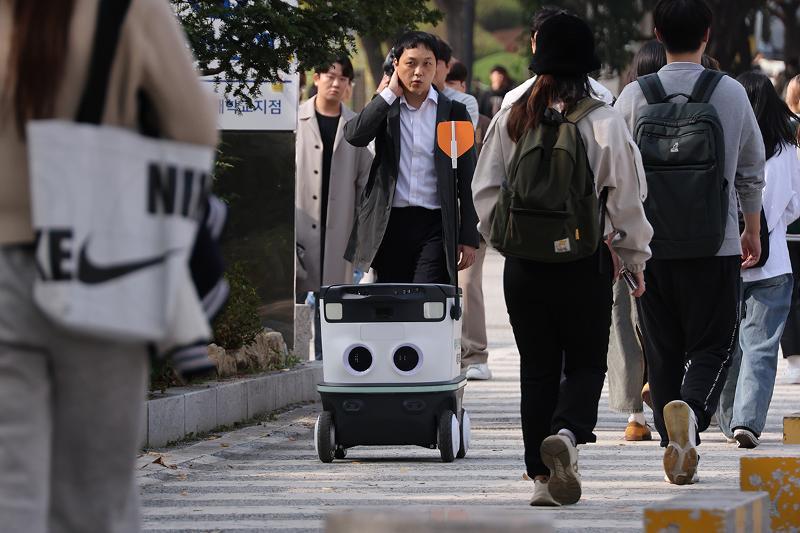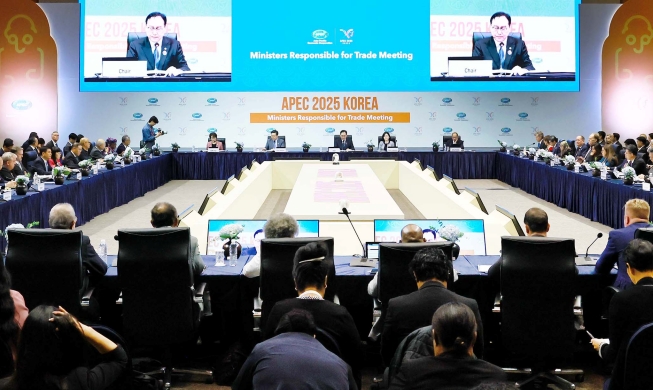
A new public project will support software development in all sectors ranging from robotics, medicine and climate to transportation and logistics. Shown is a self-driving delivery robot on Oct. 31 last year using address information to deliver its package in a demonstration at Konkuk University in Seoul's Gwangjin-gu District. (Yonhap News)
By Yoon Sojung
A new public project this year worth USD 7.6 billion will stimulate the digital services in all sectors including robotics, medicine, transportation and logistics.
The Ministry of Science and ICT on June 19 said it finalized the development tasks for the "XaaS Frontier Project" (unofficial translation) and launched it.
Combining "X" (industry) and "aaS" (as a service), "XaaS" refers to a business model of software convergence service that provides related products, technologies, processes and value chains in a variety of sectors in the form of digital services.
The ministry hosted an event that day marking the project's launch at aT Center in Seoul's Seocho-gu District, with about 100 representatives from the selected consortium and National IT Industry Promotion Agency attending. Speakers shared key content of each task and discussed how to produce results.
The project aims to find and spread key digital services optimized for each sector for the convergence of all industries and software. To this end, it offers assistance in stages in the planning, development, demonstration and expansion of consortia between demand companies and software service developers in each field like manufacturing, clothing and logistics.
For this, the project this year includes 20 design tasks worth KRW 2 billion with high potential for ripple effects, utility, and potential for growth and expansion and five areas -- robotics and medicine, climate and environment, environment, society and governance (ESG), transportation and logistics, facility and safety, and customer service -- worth KRW 5.6 billion.
The development task for the robotics and medical sectors seeks to create a service robot operation model at smart hospitals. Hallim University Medical Center, the requesting institution, will run a pilot robot service to deliver pharmaceuticals, specimens and supplies as well as conduct patient guidance and a cleaning service.
For climate and ESG, the goal is to set up an analysis platform service for the global supply chain crisis. Accordingly, design guides for climate risk analysis as required by each industry are sent to companies with demand, and information on production and manufacturers is shared. The systematic setup of an ESG climate response strategy will use services analyzing and managing overall climate risk such as unusual natural disasters like typhoons and floods and global environmental regulations.
For transportation and logistics, the objective is to build a complex transfer platform for passenger logistics centered on regional passenger terminals. This project will use the networks of public transportation card giant T-Money, which has a nationwide fare payment system, and the Association of the National Passenger Car Terminal Businesses to offer new services to passenger terminals in provincial areas facing extinction due to lack of users and outdated systems.
For facilities and safety, the task is to set up facility management services backed by artificial intelligence (AI) and the Internet of Things (IoT) for recipient companies including the Korea Water Resources Corp. The plan is to provide integrated facility management processes like efficient monitoring and management of old facilities, life expectancy prediction analysis and preemptive services for maintenance support.
For customer service, the task is to build and run cloud-based, AI-as-a-service contact centers that integrate the introduction, application and agent management processes through which facilities and systems enable customers and companies to communicate.
arete@korea.kr
